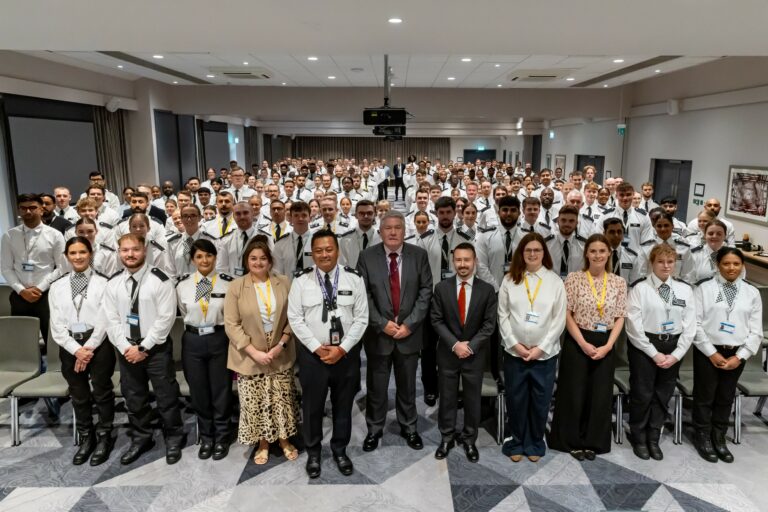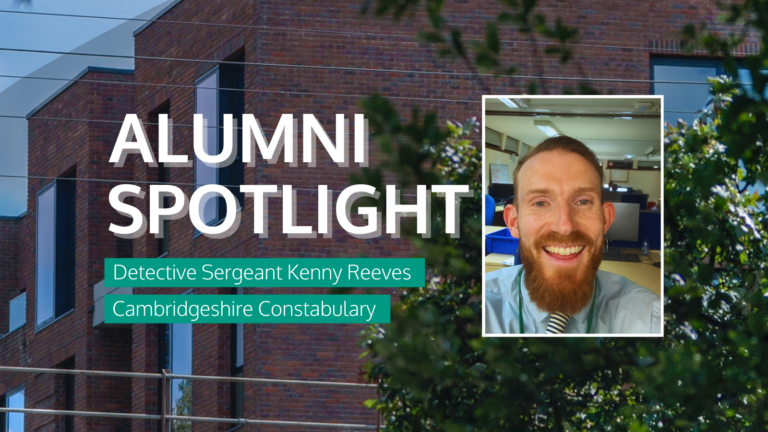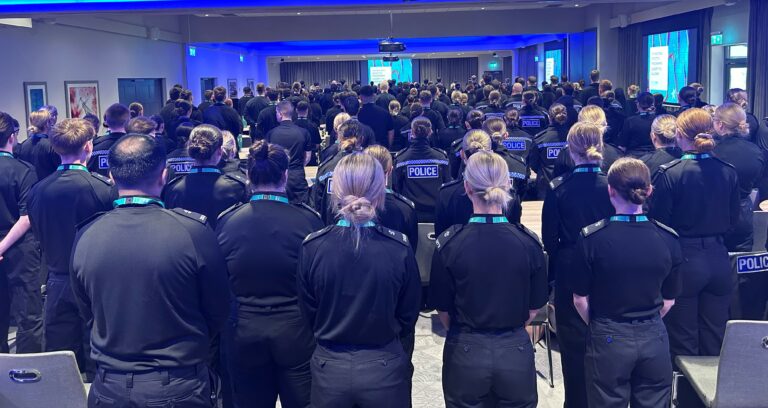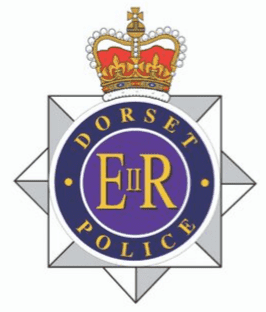Alumni Spotlight: PC Adam Carr, Neighbourhood Police Officer in Surrey Police
Wednesday 29th November 2023
Police Constable Adam Carr joined Surrey Police in 2019 via Police Now’s National Graduate Leadership Programme. As a neighbourhood police officer for Spelthorne, he worked to implement the Home Office’s Safer Streets Campaign and saw an 87% reduction in acquisitive crime across the area.
He also completed an external secondment in the Metropolitan Police Service’s Counter Terrorism Command.
Since graduating Police Now’s programme, he has trained as a Licensed Search Officer and completed a Police Search Advisor Course, which allows him to assist senior officers to execute complex search warrants. With this training, he assisted in a murder enquiry which saw the offender sentenced to a minimum of 20 years behind bars and assisted the Regional Organised Crime Unit in an international money laundering case.
He tells us about his impact and career journey so far in this month’s Alumni Spotlight.
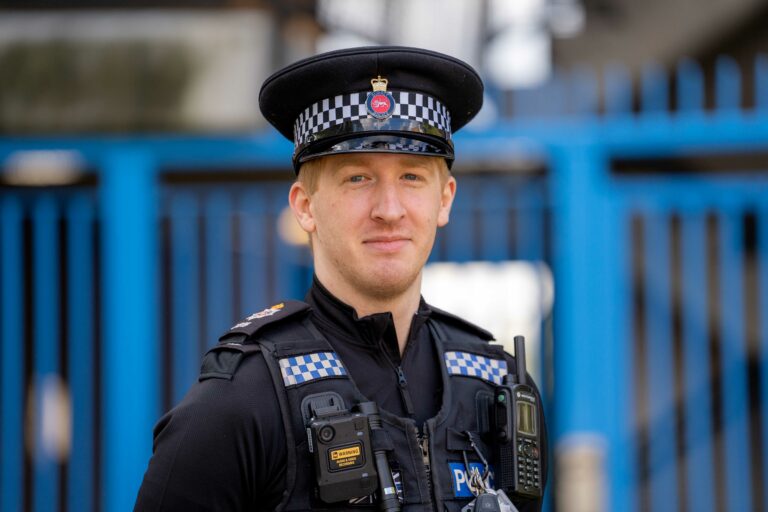
Police Constable Adam Carr
“I joined Surrey Police in 2019 shortly after graduating from Royal Holloway with a degree in Criminology and Psychology. I absolutely loved my experience volunteering as a Special Constable alongside my studies, so I decided to apply to Surrey Police via Police Now’s National Graduate Leadership Programme. Police Now’s emphasis on leadership training and building public confidence in policing, and the opportunity to embed myself into a neighbourhood policing role early on, really appealed to me.
“After completing the academy training and an immersion period on the Response team, I joined Spelthorne Safer Neighbourhoods Team for the remainder of the two-year programme. As a neighbourhood police officer, I worked to build strong relationships with community partners and tackle the problems affecting people across Spelthorne, such as drug-related harm and anti-social behaviour.
“In this role, I led on a transformative project for the area when we received £547,000 in funding from the Home Office’s Safer Streets campaign. The Safer Streets initiative supports forces and local authorities to invest in neighbourhood crime prevention, particularly looking at and changing the environmental factors that impact crime rate, such as poor street lighting, street design and layout, and CCTV. With the new funding, I worked with the local council, housing association and other community partners to ‘design out crime’ in the area. This included installing more advanced CCTV, anti-theft mailboxes, secure fencing in open-space areas and more secure gating and entry systems at residential and community properties. We also sourced over 1,000 forensic property marking kits and distributed these amongst the community, which helps prevent burglaries and aids the tracing and returning of stolen property. This work was all about taking proactive and long-term measures to prevent crime from happening in the first place, and making changes that would have wide-spread positive impact for a large number of people.
“As a result of the project being implemented, we saw immediate reductions in acquisitive crime in the area, even in the first three months after the works were completed. Residential burglary saw a 21% decrease and business burglary saw a 76% decrease. In general, offending in the specific area the project was implemented saw an 87% reduction in acquisitive crime offences.
“I really love neighbourhood policing and think it’s a great place to have started my career; the scope of the role is vast and varied, which allows you to build an incredibly strong foundation of skills and knowledge. Since completing Police Now’s programme, I have stayed in my neighbourhood policing role and remain committed to supporting members of my community.
“I have also developed my policing skills further by becoming a Licensed Search Officer (LSO) and last year completed my Police Search Advisor Course (PolSA), run by the Police National Search Centre on behalf of the College of Policing. This means I am now qualified to assist with a variety of complex searches, including searching premises or crime scenes for evidence and helping locate missing people. This role sees me serve an on-call function, providing advice to senior officers in the case of Counter Terrorism (CT) searching, complex and major crime investigations, and high-risk missing persons. This role often has me working closely with other specialist units, including CT Specialist Firearms, the National Police Air Service (Police Helicopter), and voluntary organisations such as search and rescue teams. It also gives me the opportunity to assist other forces, including travelling to Birmingham for the Commonwealth Games last year.
“For example, I assisted our Regional Organised Crime Unit with a premises search whereby several electronic devices and documents were located in an international money laundering case. I also assisted in a complex murder enquiry that resulted in an offender being identified, convicted, and sentenced to a minimum of 20 years in prison. In that case, I was deployed over several days to search a vast rural area for items that the suspect was believed to have discarded after the offence, which included having an understanding of the area and the possible routes the suspect could have taken. In another murder enquiry, I advised the Senior Investigating Officer on all matters search related, which included planning, resourcing, and writing search strategies for over two weeks of search activity. This encompassed 12 different crime scenes and the deployment of 60 Licensed Search Officers, working closely with Crime Scene Investigators, Specialist Search Dogs, Drone Officers, and Digital Investigation Support Officers. The suspect has been charged with murder.
“There are a lot of development and networking opportunities in policing like this. For example, whilst I was on the National Graduate Leadership Programme, Police Now facilitated a four-week external secondment to the Metropolitan Police Service’s Counter Terrorism Command. I worked on a research project looking at the role of volunteers and community members in the fight against terrorism, which broadened my understanding of how community policing ties in with national policing operations and gave me an insight into CT and some of the different areas I might be able to move in to. Having started as a volunteer Special Constable myself, it was a great project to work on. I am interested in further work with CT in future, but for now I am happy in my neighbourhood policing role as I continue to support people in my community and hopefully work towards becoming a sergeant.”
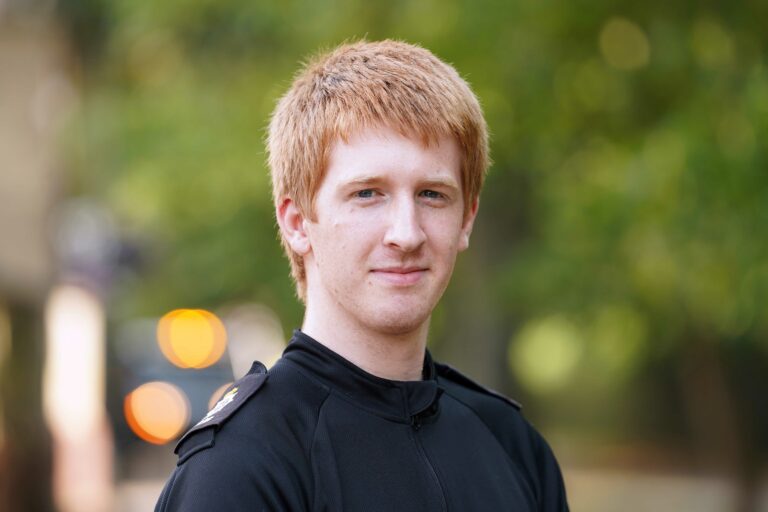
Acquisitive crime is defined as an offence where the offender derives material gain from the crime. Examples include shoplifting, burglary, theft, and robbery.
The above statistics relating to reduction in acquisitive crime were calculated from monthly averages between December 2019 – March 2020 compared to monthly averages December 2020 – March 2021. The project was implemented December 2020


